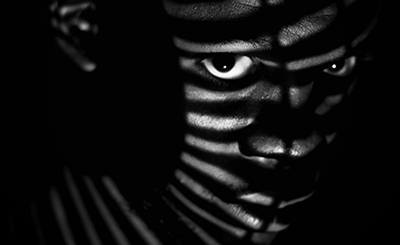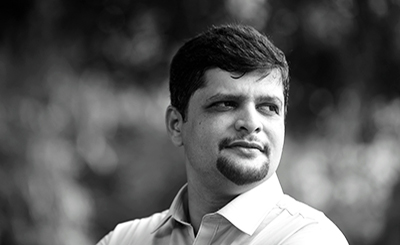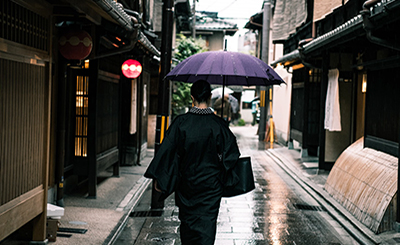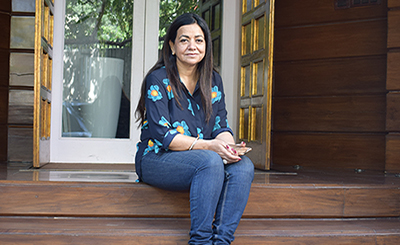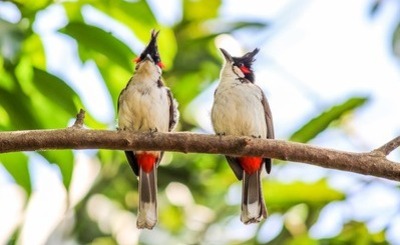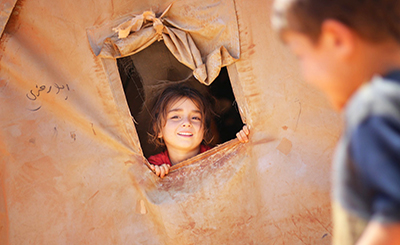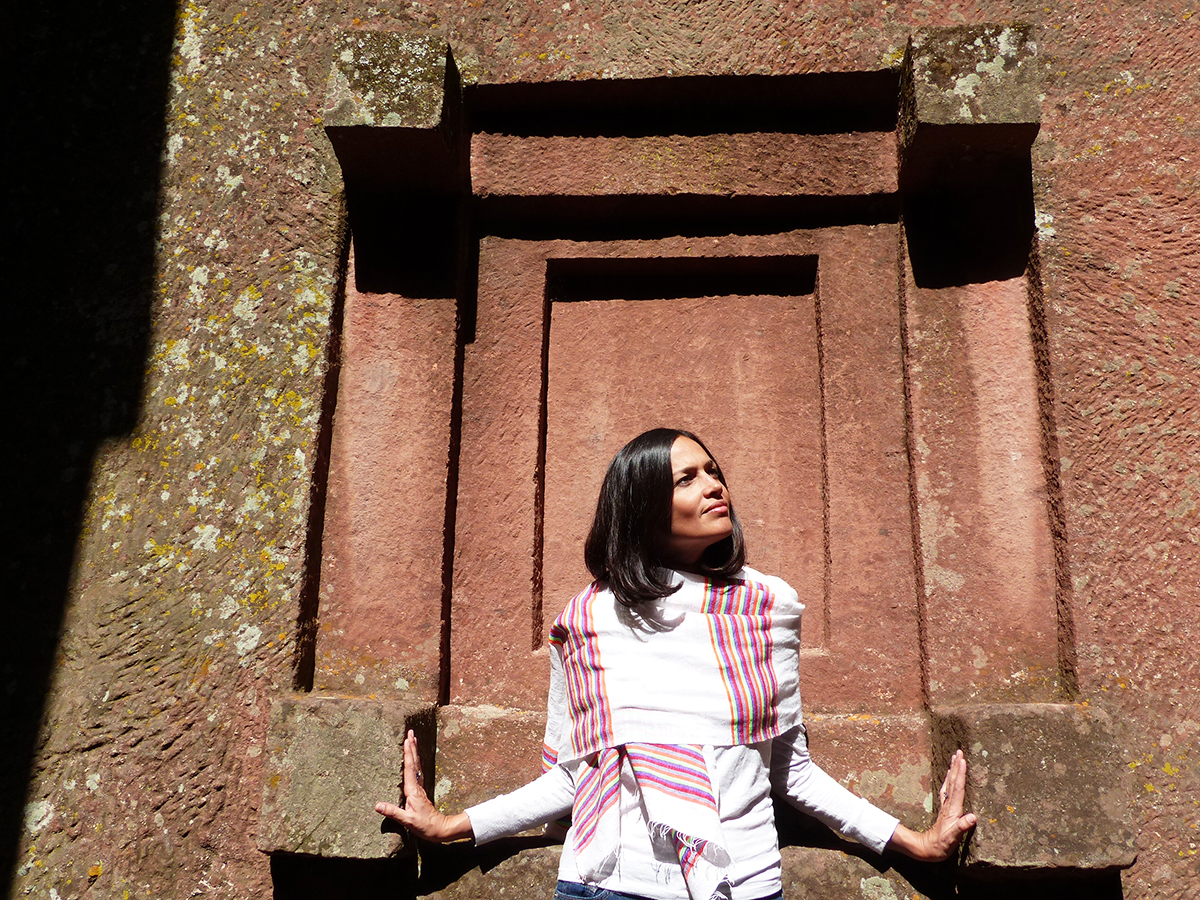
Tishani Doshi in Lalibela, Ethiopia. Photo: Carlo Pizzati
Poet’s Note: Poems As A Way to Speak Back to Headlines
Much of my new collection, A God at the Door, was written during the coronavirus pandemic in 2020. I had been writing poems leading up to this, mainly responses to news items ranging from the comic to the disturbing to the absurd — the Indian minister of higher education stating that Darwin’s theory of evolution was wrong and therefore must be removed from school curricula, for example, or Filipino President Rodrigo Duterte ordering soldiers to shoot female communist rebels in the vagina (“We will not kill you. We’ll just shoot you in the vagina”), or the comeback of Speedos, or the dangers of the Brazilian butt-lift surgery. It was as though in order to draw inward to write a poem, I needed a prod from the news cycle.
At the start of 2020, I was commissioned to write six poems for Granta’s “Membrane” issue, beginning with the smallest unit of existence — the cell, expanding out to the cosmos. Writing these poems made me think about borders — porous and nonporous, inner and outer, micro and macro, the collapse between the you and the I. During this time, I was also reading the work of Kashmiri mystic Lal Ded (translated by Ranjit Hoskote), whose powerful vakhs helped reframe old ideas I’d had as a dancer — how the body is a universe, the idea of lokapurusha — cosmic being — inside whom there are mountains, galaxies, rivers. So, I was thinking about the idea of connection and non-duality, and all this deepened and complicated over the extended lockdown that was 2020.
If I had to come up with a list of keywords for the poems in this collection they would be: loneliness, longing for home, survival, extinction, migration, body, deity, seeing, individual, collective, holy.
The sense of disembodiment people experienced during the lockdown was immense. There was the physical isolation to start with, inability to touch because of the dangers touch brought. For those of us who had screens, technology offered some avenues of connection and intimacy, but overwhelmingly, people continued to feel alienated. Add to the layer of coronavirus and the huge inequalities in healthcare it brought to the surface, there were other horrors: the Beirut blast, the killing of George Floyd by a policeman in Minneapolis and the killing of Jeyaraj and Fenix in police custody in Tamil Nadu, a shooting in a maternity clinic in Kabul, continued climate concerns and species extinction. As a poet I was looking to hold all this breaking, but also looking for areas of restoration, transformation and hope. I found two touchstones, and they were old ones: body and language.
Part of why so many of the poems are responses to news items is because we are bombarded by the news, and with greater confinement, even more boxed in by the news. The language of newspeak is the opposite of the language of poetry — it bombards and jolts, then deadens and desensitizes. I see poems as a way to speak back to these headlines, to restore power to language and to offer an alternative space and time zone from the relentlessness of the news cycle. The question I kept asking was where is hope in all of this, and what is holy anymore? I wanted my poems to have all the intensity of the lyric form but framed in the political now. Essentially, I kept coming back to the body as a site of renewal, the idea that any pilgrimage must lead back to ourselves, our bodies.
A continuing theme carried over from Girls are Coming Out of the Woods, is violence — what it does to those of us who are bystanders, victims, witnesses, survivors. How to write about systemic violence, particularly if there are videos of these violences, like the many lynchings of Muslims and Dalits captured on mobile phone videos in India, which are then circulated and ‘consumed’ — how that becomes a double violence. There’s a continuing rage about the violence toward female bodies worldwide, not just violence done to the body, but the violence of disappearing — as in the news story which disclosed that 21 million Indian women were denied the right to vote because their names weren’t registered on voting lists. That is also a kind of vanishing.
Ultimately, what can a poem do? It can act as a bridge. It can allow us to connect our personal losses to public grief, it can offer glimpses of beauty, and I hope, humour and irreverence too. In the spirit of some great female rage-makers like Frida Kahlo, Louise Bourgeois and Amrita Sher-Gil, who find their place in these pages, a poem can also enshrine the idea that the making of art can be a cohesive radical act of solidarity and joy.
This May Reach You Either as a Bird or Flower
For Varavara Rao
Sooner or later we must return
to the rooms from which we emerged.
The earth of your childhood is the earth
of mine, even though it may seem we live in
two different countries. You are a dangerous
poet in yours. I am trying to be one. In every
republic there will be some who walk down to
the water with life vests and bread, while others
lead soldiers to trapdoors in the cellar. You stand
at the edge, beating a drum. They say you’ve been
standing there sixty years, drumming, drumming.
Sir—are you warm? Are the crows bringing you the
latest terrible news? The mobs haul bodies from beyond
the campfires with leaves tacked to their eyes and throats
filled with dust. You should know there’s been a breach. The
curtain is not made of iron. The offspring of your arrests have
formed their own political party in prison and are spreading
rebellious thoughts like a virus refreshed after a summer rest.
We must consolidate while there’s oxygen left. A day will
come when we are gathered in a courtyard for a historic
photo, and asked to denounce the pawns, the black and
white squares, the horses and rooks. Everyone but
the crooks. It will no longer be possible to say
your homeland is not my homeland
because it doesn’t speak English.
The languages we love will be
thrown in a ditch. A country
forgets how many countries
it’s been. Nothing is gentle
about memory. The sky
speaks in howl, grass
whispers back. We
are already on
our knees.
What else
can we
do but
resist?
Postcard to My Mother-in-Law Who at 16 is Chasing
Brigitte Bardot in St Tropez
At sixteen we are a rare species. Rocks share our secrets. The gap between
who we are and who we want to be is epic. Those who love us would secure us
with safety nets. We long to fall. Try not to fall. Dopamine is rapacious — a long
glittering beach that runs through us. Dear Editta, nothing can shake you. Already
you are the most chic person in your family. When you go home, you will sew
a pink and white gingham dress just like Bardot’s. Your friend in the hotel —
the other Italian girl — her name is gone. But for now, you are both unmoored
in the streets of St Tropez. There’s Jacques Charrier! He’s buying cigarettes.
He’s so close, OMG….is that a pimple, how does he get to be with HER?
Sixty-one years pass. Marriages are wrecked. Brigitte’s. Yours. The dangers
you chose litter the coastline like dregs. Only a picture remains of you
in that dress, face turned toward the sky as though it were the past,
which is no place to come back from. So much wet sand. And the story
of course. Your father in his faltering French, asking for the good road,
la vie est bonne; the stranger answering, yes, life is good!
My Loneliness is Not the Same as Your Loneliness
My loneliness is not the same
as your loneliness, although they send
each other postcards and when they meet
they relax enough to nap
on each other’s sofas.
I’ve never felt more alone
than when I was being burgled,
our bodies facing one another,
the burglar and I. Can I help,
I asked but really, what I was saying
was, stay, don’t leave.
You say you’re sometimes jolted awake
by the horror of eating animals,
how most mornings it passes,
but once, you walked downstairs to find
a watermelon had exploded on your table,
all that rotten red froth seeped
through the tablecloth
and even though I understood
this explosion exploded something
in you, that it has to do with bodies —
yours and mine, the animals, the watermelon,
the burglar, the thread between us,
I could not reach for your hand,
could not say, don’t live among strangers.
They say it starts in childhood,
or being alive in a large country where
all the roads are empty and lead in.
They say go east, go west, go somewhere,
start something, but where can you go
if you don’t know how to manage thirsty
buffaloes, if the past is a birdcage
that grows larger the farther away
from home you get?
I left town, hit a patch of feeling blue,
called you. Funny story, you said,
Puppy just shredded eighteen volumes
of the Mahabharata.
What’s happening
with you?
I say, you know, I’m on the road,
it’s the underground guerilla life for me,
dirt and celibacy. All I can hear
are birds and sirens, and sometimes,
birds imitating sirens.
We’re quick to tell each other
it’s okay, it’s okay, we can’t all
be preceded or followed by something.
We can’t all carry around tanks of oxygen
or storm through doors reeking
of whiskey and Pernod.
There’s no known cure.
It isn’t true about daily b-12 shots
or living in a commune. In wars
there are almost always the same number
dead from starving as from combat.
Whatever it is, it lives in the body
and will stay till the body
runs aground.
Singers say they hear the next note
before they sing it. My loneliness
is something like that. I know
not just what it is, but how
it will sound.
There’s a child screaming
in the playground below, a refrain
so shrill it scrapes a layer off the air.
She’s reassuring herself, she’s not alone.
No one tells her, we’re here together,
you’ve been heard.
After a Shooting in a Maternity Clinic in Kabul
No one forgets there’s a war going on,
but there are moments you could be forgiven
for believing the city is still an orchard,
a place where you could make a thing grow.
There is always a pile of rubble from which
some desperate person struggles to rise,
while another person wraps a shawl
around their shoulders and roasts
marshmallows over a fire.
This is not that.
This is not bomb dropping from sky,
human shield, hostages in a stream, child
picking up toy that explodes in her hands —
although there’s always that — hope is a booby trap.
This is the house you were brought to after crossing
a river, leaving the mountains and burnt fields
behind. A place of safety where you
could be alone with your own
startling power.
Not Why were you out? And why
wasn’t your face covered? And who told you
to climb into that rickshaw? But here, prepare
for this most ordinary thing, a birth. And this is not
to ask what it means to never see someone again,
but to ask what it means not to make it past
the first checkpoint of your mother’s gates.
Never mind all the wild places
outside —
the mud-brick villages, the valleys and harvests
and glasses of green tea. Or even to say, I am here
to claim the child of Suraya because you know
this to be impossible. Even if you could bring a man
to recover your sister’s corpse and the newborn,
where do you go from here? You still have
to consider the bodies, the bullet-ridden
walls, still have to climb up to the small
window of this house and take in
the panorama.
See — it is raining outside and men weep
for their wives, and perhaps the entire world
is an orchard that has detonated its crimson fruits,
its pomegranates and poppies and tart mulberries
to wash these floors red, and those of us who stand
outside this house know that nothing will flourish
here again. Like crowds who gather
for an execution, we can only ask,
what does it mean to be born
in a graveyard, to enter
the world, saying,
oh thief, oh life.
A God at the Door will be published by HarperCollins India in August 2021
The essay and the poems are part of our Poetry Special Issue (January 2021), curated by Shireen Quadri and Nawaid Anjum. © The Punch Magazine. No part of this essay or the new poems exclusively featured here should be reproduced anywhere without the prior permission of The Punch Magazine.
More from The Byword
Comments
*Comments will be moderated
Amazing lines, evocative, poignant, haunting. Loaded with power
Kankana Basu
Feb 12, 2021 at 01:34




